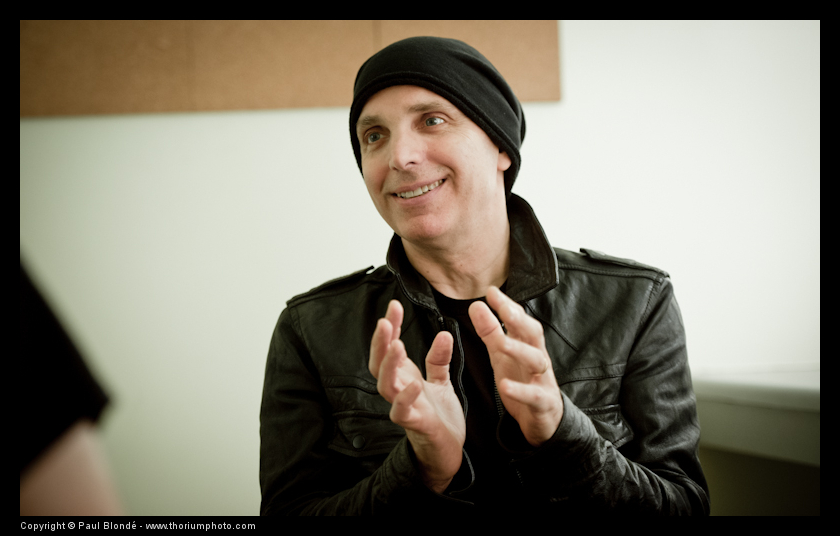En Entrevue: Joe Satriani

Thorium a eu la chance de rencontrer le légendaire guitariste Joe Satriani lors de sa tournée de promotion pour l’album Unstoppable Momentum. Au menu: comment créer de la nouvelle musique pour un 14e album et comment réunir un groupe de musiciens de talent autour d’un guitar god.
T : How goes your tour so far ?
Joe Satriani : It’s been great ! We started touring back in the summer, we’ve been in Europe for five weeks, and we’ve been out for a month and a half across the US. We’ve been in Canada for almost a week, it’s been really good.
T : How does it feel to be back in Montreal ?
JS : I’ve only been here a few hours ! I usually really connect with a city when I go out on stage and go in front of the audience.
T : You’ve released a new album in 2013, Unstoppable Momentum. How hard is it to come out with new music after thirty years ?
JS : It’s funny because the album title is all about the fact that it’s not been difficult. I was surprised at how excited and interested I was. The big picture about coming up with a concept for a album is getting smaller. What kind of music, what kind of songs will we play ? Even the little things, what pics will I use, will I change the size of my strings… All those things, still, I find very exciting to deal with, even the tiniest of details. I wrote the title track based on that realisation, that after so many years I’m still as excited as a teenage kid who gets his first guitar !
T : How do you feel this album compares to the rest of your catalog ?
JS : It’s hard for me to say. It’s something for you to decide : The critics, the reviewers and the fans have a different, a more unbiased way of looking at it. For me the albums are all works in progress, I don’t really finish them. I never look back and compare them either, I don’T think that way. I always think about moving forward. My main concern is if I captured, on the new album, exactly how I felt at that moment. When I’m done, I force myself to think about the next record.
T : There are a lot of backing tracks, piano, etc. on the newest record. What can we expect from it live ? Was the rearrangement difficult ?
JS : You have to be prepared, and the musicians have to be really good to pull it off. I think ultimately the payoff is in the organic nature of the recording, and the audience picks off on that. It becomes a record they can listen to over and over again, and it sorts of becomes fresh each time they listen to it. I feel that’s the beauty of having either all live or partial live performance as part of a recording.
T : You’ve built a very different band for the tour than you had for the album. How hard is it to pull a show off with them ?
JS : I got really lucky that I could work with a team that had worked together before. On the new record I had Chris Chaney on bass, from Jane’s Addiction, and Vinnie Caliuta on drums, and Mike Keneally who’d come back from my previous album and tours. When I was thinking about putting a band together, I was thinking that this new band has to not only interpret the new album, but also look back to all the albums, all the thirteen previous studio records, and all the things that we’ve done at G3, and the live DVDs. I thought that it would be great if I could get guys that know each other a little bit. Turns out that Marco Minnemann, Bryan Belley and Mike have played with each other in different forms for twenty years. They played in Aristocrats, they play in Dethklok, Zappa Plays Zappa, even each others’ solo albums and tours. That gave me a chance to tap in how they can improvise with each other on stage.
T : Are they part of the creative process to go from the studio recordings to the live act ?
JS : The way that we’ve always run the show is that it’s a balance between discipline and melody. It’s really what the audience is responding to. They fall in love with the music because of the melody, harmony and uniqueness of each song. If you start to break that down, the whole thing falls apart, because we don’t have lyrics. If it’s an instrumental and screw around with melody, you’ve lost it ! You have to preserve that in each one of the songs. What we’ve been able to do is take the arrangements of some of the songs and designate areas for improvisations. This is where this particular live band has been particularly shining. It makes each night a little bit different and keeps the tour really fun for us.
T : How do you get all those guys together ?
JS : You give them a call ! *laughs* See if they want to do it ! Everybody has to move their schedule around for it to work. We all respect each other’s different desires, and we want to accomplish with our different bands. You give me march and april, I’ll give you june and july, you give me september and october and keep november and december. That kind of things.
T : How hard is it to conciliate all your touring with your personal life ?
JS : It’s not too bad. My family’s been around me most of the time, and I think combining family with music is a great way to live. It’s really not a problem for us.
T : You’re also known for your guitar teaching. You’ve tutored a lot of now famous musicians over the years, some of them we still hear about. How important for you is it to share your love of music that way ?
JS : Many years ago, teaching was kind of a day job for me. I was in a rock band that played clubs in the San Francisco Bay area, during the day I was teaching guitar, and it was a lot of fun, kept me involved in music instead of waiting tables, or whatever. Since I spent my whole life in music, I never really had another profession to rely on. I became a very lucky teacher in that I had students like Kirk Hammet, Alex Skolnick, charlie Hunter… A host of really great players. They made teaching a lot of fun. I haven’t been a professionnal teacher from January of 1988, I gave my last lesson to Kirk Hammet and then I went out on the Surfing with the Alien tour, and it’s not something I do anymore.
T : Is it something you want to start again if you stop touring eventually ?
JS : Maybe. I’m not really sure. I recently thought it would be a shame to stop traveling, I really love going around the world, there’s so many great places to go. I’ve kinda fallen in love with all the poeple around the world that we’ve played for. I just think I’d slow it down, as I get older. Right now, we’re still rocking and rolling pretty hard, because we like it. Once in a while, we’ll do a master class or a rock n’ roll fantasy camp, but I only do maybe one every couple of years.
T : From your teaching years, can you tell something to all the budding guitarists out there ?
JS : You gotta practice ! If you don’t practice to play well, you’re gonna perform pretty badly. That’s what I used to see over and over again. I know when you’re very young playing music is very much your social scene, sometimes people can overpractice a few things. The hardest thing to teach a young person is to practice a little of a lot of things, and to prepare for ten, twenty years down the road. I know exactly what it’s like to be fourteen and standing on a stage in high school, you feel the pressure of your friends more than the weight of musicianship. Most likely, musicians who are 14 or 15 will live to be 50 and will be playing music somewhere. All that work that they didn’t do will be obvious. That comes a lot earlier than they think. In their 20’s, it becomes obivous if they really practiced well in their teens. It’s not about practicing to play the fastest, it’s about trying to understand what notes and chords do to the audience. That’s what it’s all about. We provide music and it has an emotional impact on our audience. They depend on us to give them music, we all need it in our lives. When you get that straight, you start thinking : Well, I have to understand chords and scales and melodies and timing. It’s hard to imprint a young person with that, but that’s the lesson that will benefit you the most. It can be in any style, theory has no style ! You don’t have to stress your body by trying to play too fast or the same over and over again just to impress your buddies. No one’s interested in that.
T : All right, anything else you want to add for your Montreal fans ?
JS : I just want to say thank you for inviting us back ! We love it here, I’m so glad to be back !
Entrevue: Phil Mandeville
Photographe: Paul Blondé
Pour en savoir plus: Joe Satriani









